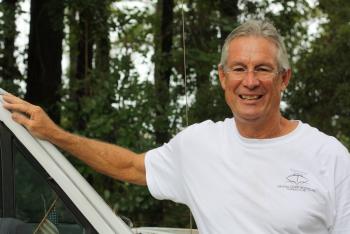Jess Hawkins

1997 North Carolina Fisheries Reform Act
The Fisheries Reform Act is the most significant fisheries legislation in NC history.
In 1994, the North Carolina General Assembly approved a moratorium on the sale of new commercial fishing licenses and established the 19-member Fisheries Moratorium Steering Committee to oversee a study of the state's entire coastal fisheries management process and to recommend changes to improve that process. The Moratorium Steering Committee included legislators, fisheries managers, scientists, commercial fishermen, and recreational fishermen. The committee commissioned six research studies and reviewed a broad range of issues, including fishing licenses, fishing gear, habitat protection, agency organization, and law enforcement. The committee issued a draft report in the late summer of 1996, held 19 public meetings across the state, and adopted a final report in October 1996 that formed the basis for the Fisheries Reform Act. Governor James B. Hunt signed the Act into law on August 14, 1997.
The 1997 North Carolina Fisheries Reform Act: An Oral History Perspective was made possible by the North Carolina Sea Grant Community Collaborative Research Grant Program.
Mary Williford
Jess Hawkins is a seasoned Marine Biologist who has dedicated his career to the management and conservation of marine fisheries. Born and raised in Bath, North Carolina, Hawkins developed a love for the outdoors, fishing, and hunting from a young age. This passion led him to pursue a career in marine biology. Hawkins began his career as a Fisheries Biologist with the North Carolina Division of Marine Fisheries, initially working as a Field Biologist in Little Washington before transitioning to an administrative role in Morehead City. In the latter part of his career, Hawkins served as the Marine Fisheries Commission Liaison, acting as the contact person between the Division and the Commission, which is responsible for making rules concerning coastal fisheries in North Carolina. Hawkins played a significant role in the development of the Fisheries Reform Act, which reorganized the governance structure for managing coastal fisheries in North Carolina [3]. His contributions to marine conservation have been recognized by both his peers and the public, earning him the Order of the Long Leaf Pine Award and the Conservationist of the Year Award by the Wildlife Federation [6].
Scope and Content Note
This interview with Jess Hawkins, conducted by Barbara Garrity-Blake on October 7, 2016, provides an in-depth look into Hawkins' professional background in marine fisheries, his role in the Division of Marine Fisheries and the Marine Fisheries Commission, and his significant contributions to the Fisheries Reform Act. The interview delves into the contentious issues surrounding marine fisheries, including the use of gill nets and shrimp trawling practices, the role of the medical community and local food movements in supporting domestic fisheries, and the hope for continued efficacy of Fisheries Management Plans. Hawkins also discusses the challenges and successes of the Fisheries Reform Act, including its initial success in its first decade and the factors that led to its decreased effectiveness in its second decade, such as decreased funding and utilization of advisory committees. The interview also touches on the diverse coastline of North Carolina and the many types of commercial and recreational fishers in the state. Hawkins' insights into the importance of public input in the process of fisheries management and his hopes for the future of sustainable, ethical fisheries stewardship are also discussed. The interview concludes with Hawkins' advice for young professionals entering the field of fisheries management, emphasizing the importance of humility, listening, caring, and recognizing progress, no matter how small. His reflections on the future of commercial fisheries, the role of science in decision-making, and the potential impact of consumer education and local food movements provide valuable insights into the challenges and opportunities facing marine fisheries management.
Please Note: The oral histories in this collection are protected by copyright and have been created for educational, research and personal use as described by the Fair Use Doctrine in the U.S. Copyright law. Please reach out Voices@noaa.gov to let us know how these interviews are being used in your research, project, exhibit, etc. The Voices staff can help provide other useful resources related to your inquiry.
The NOAA mission is to understand and predict changes in climate, weather, oceans, and coasts, to share that knowledge and information with others, and to conserve and manage coastal and marine ecosystems and resources. The Voices Oral History Archives offers public access to a wide range of accounts, including historical materials that are products of their particular times, and may contain offensive language or negative stereotypes.
Voices Oral History Archives does not verify the accuracy of materials submitted to us. The opinions expressed in the interviews are those of the interviewee only. The interviews here have been made available to the public only after the interviewer has confirmed that they have obtained consent.
